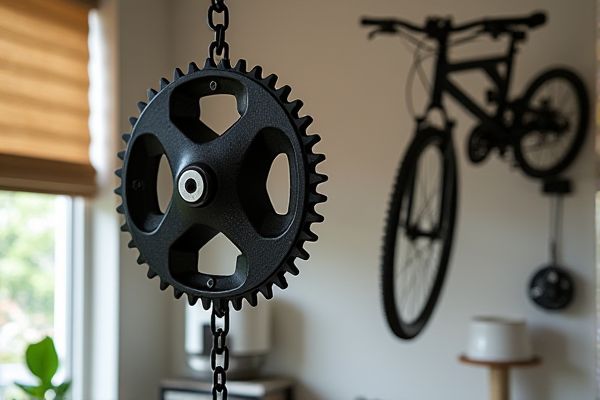
Bike pulleys offer a compact, space-saving solution by suspending your bike from the ceiling, making it ideal for small areas, while bike wall mounts securely hold your bike against the wall, providing easy access and stability. Explore the rest of the article to determine which option suits your storage needs and enhances your bike maintenance routine.
Table of Comparison
| Feature | Bike Pulley | Bike Wall Mount |
|---|---|---|
| Purpose | Lift and store bikes vertically through pulley system | Securely hang bikes on wall using hooks or brackets |
| Space Efficiency | Maximizes vertical space, ideal for high ceilings | Requires wall space, good for medium to low ceilings |
| Installation | Ceiling-mounted system, moderate installation effort | Wall-mounted brackets, easier and quicker to install |
| Weight Capacity | Typically supports 30-50 lbs | Supports 35-70 lbs depending on model |
| Accessibility | Requires effort to raise/lower bike | Instant access by lifting bike off mount |
| Price Range | $20 - $50 | $25 - $70 |
| Best Use Case | Small spaces with high ceilings | Garages, apartments, or rooms with empty wall space |
Introduction to Bike Pulley and Wall Mount Systems
Bike pulley systems utilize a rope and pulley mechanism to hoist bicycles vertically, maximizing ceiling space and providing convenient storage in garages or apartments. Bike wall mounts offer secure, easy-to-install brackets that hold bicycles horizontally or vertically against walls, optimizing floor space and accessibility. Both solutions cater to efficient bike storage, with pulleys ideal for high ceilings and wall mounts for quick bike access.
Overview of Bike Pulley Storage Solutions
Bike pulley storage solutions offer a compact and flexible way to store bicycles by suspending them from the ceiling, utilizing pulleys and ropes to easily lift and lower the bike, saving floor space and preventing clutter. These systems are ideal for garages or rooms with higher ceilings, where vertical space can be maximized without permanent wall attachments. Compared to bike wall mounts, pulleys provide adjustable height options and can accommodate various bike sizes, promoting efficient use of vertical storage areas.
Overview of Bike Wall Mount Storage Options
Bike wall mount storage options include horizontal, vertical, and foldable designs, each optimizing space and bike accessibility differently. Vertical mounts hold the bike by the wheel, ideal for narrow spaces, while horizontal mounts support the frame, offering easier access for maintenance. Your choice depends on available wall space, bike type, and how often you need to use or move the bike.
Space-Saving Benefits: Pulley vs Wall Mount
A bike pulley system maximizes vertical storage by allowing you to hoist your bike overhead, freeing up valuable floor space without permanent wall modifications. In contrast, a bike wall mount keeps your bike securely fixed against the wall, saving horizontal floor space but requiring sturdy wall installation. Your choice depends on available room configuration and whether you prefer flexible vertical storage or fixed horizontal placement.
Weight Capacity and Bike Compatibility
Bike pulley systems typically offer higher weight capacity, often supporting bikes up to 70 lbs, making them suitable for heavier mountain or electric bikes. Wall mounts generally support bikes up to 55 lbs, catering well to road and hybrid models with simpler installation. Your choice should consider the bike's weight and frame type to ensure compatibility and secure storage.
Installation Process: Pulley vs Wall Mount
Bike pulley systems require more complex installation, often involving ceiling anchoring and precise alignment to ensure smooth movement and weight distribution. Wall mounts are generally easier and quicker to install, secured directly onto sturdy wall studs, making them ideal for limited space and straightforward anchoring. Your choice between a pulley or wall mount depends on available space, ceiling strength, and whether you prefer a dynamic lift system or a fixed storage solution.
Accessibility and Ease of Use
Bike pulleys offer superior accessibility by allowing users to effortlessly lift and lower bicycles with minimal physical effort, making them ideal for high-ceiling spaces. Bike wall mounts provide straightforward access by securely holding bikes at eye level or within easy reach, simplifying daily use and maintenance. Both solutions enhance storage efficiency, but pulleys excel in vertical space utilization while wall mounts prioritize immediate accessibility.
Durability and Maintenance Requirements
Bike pulleys often feature robust metal construction with sealed bearings, offering high durability and requiring minimal maintenance such as occasional lubrication. In contrast, bike wall mounts are typically made from coated steel or aluminum, providing strong support but may need periodic checks for mounting stability and rust prevention. Both options ensure long-term use, but pulleys demand less frequent upkeep due to their enclosed mechanical design.
Cost Comparison: Pulley vs Wall Mount
Bike pulleys generally cost less than bike wall mounts due to simpler design and fewer materials required. Wall mounts often involve higher expenses for sturdy brackets and installation hardware, increasing upfront costs. Choosing a pulley system can save money while providing flexible storage options for your bike.
Choosing the Best Storage Solution for Your Needs
Bike pulleys offer a vertical storage solution that maximizes ceiling space, ideal for those with limited floor area or taller garages, allowing you to lift your bike effortlessly. Bike wall mounts secure your bike horizontally or vertically on a wall, providing easy access and quick storage, perfect for frequent riders wanting convenience and visible display. Assess your space constraints, bike weight, and frequency of use to choose the best option that fits your lifestyle and keeps Your bike organized and protected.
 homyna.com
homyna.com